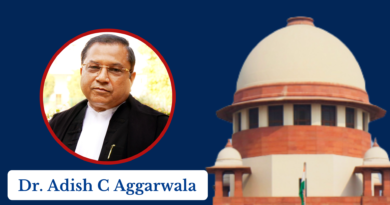Sedition Law Curbs Free Speech, Freedom of The Press:2 Women Journalists Patricia Mukhim and Anuradha Bhasin Move Apex Court Against Section 124A IPC.
(Judicial Quest News Network)
Section 124A of IPC which criminalises the sedition under challenge before the supreme court by Patricia Mulhim, Editor, the Shillong Times and Anuradha Bhasin, Owner of the Kashmir Times, expressing that the section 124A (sedition) of the Indian Penal Code will continue to haunt and hinder the right to free speech and the freedom of the press.
Challenging the constitutional validity of the sedition law contending that the colonial-era penal provision was being used to intimidate and punish scribes.
It is pointed out that the three-tier categorization of the punishment for the offence of sedition, ranging from life imprisonment to fine simpliciter, without any legislative guidance for sentencing, amounts to granting unbridled discretion to judges, which is hit by the doctrine of arbitrariness and violates Article 14. The plea said.
The petitioners contended that the term ‘sedition’ ventured into India with Lord Macaulay’s Draft Penal Code of 1837. Macaulay ‘s Draft Penal Code, 1837, consisted of Draft Section 113 with the proposed punishment of life imprisonment, that corresponds to the present-day Section 124A IPC. However, this offence was not included in the Indian Penal Code when it was enacted in 1860. As noted in the Law Commission of India’s Consultation Paper on “Sedition” (30 August, 2018), this was probably a “mistake”, as recorded in a letter by Sir Barnes Peacock to Mr. Maine, which was referred to by James Stephen, and it was rectified by the inclusion of the penal provision of ‘Sedition’ under Section 124A IPC in 1870.
The petitioners further contended that That the NCRB data for 2014-2019 shows that in the said 6-year period, 559 persons were arrested all over India for the offence of sedition, while only 10 persons were convicted, and 73 persons were acquitted. This is represented in the chart prepared by Article 14, a research-oriented organization of lawyers, academics and journalists, which is reproduced below.
The National Crime Records Bureau (NCRB) data shows a steep rise in the cases of sedition, with a 160% rise from 2016 to 2019, simultaneously
accompanied by an abysmally low conviction rate, which dropped to 3.3% in 2019. It is increasingly clear that sedition remains the prince of the political provisions in the Indian Penal Code, and its continued operation is in grave violation of the fundamental rights’ jurisprudence developed by this Hon’ble Court. Hence, the Petitioners have filed the present writ petition in public interest seeking inter-alia the immediate striking down of Section 124A of the Indian Penal Code.
The plea states that in view of the evolution of jurisprudence of fundamental rights by this Hon’ble Court since 1970 till 2021, the impugned penal provision may be struck down as being ultra vires Articles 14, 19 and 21 of the Constitution of India.
Reliance was placed on various Supreme Court judgements tarting form RC Cooper V. Union of India (1970) 1 SCC 248, where a 11- Judges Bench had held that the real test of constitutionality lay noy in the object of the legislation but in the “real impact” it has on the life of an individual.
The plea also refers to the case of KS Puttaswamy V.Union of India (2017) 10, where the test of manifest arbitration was applied.
The petitioners have pointed that it is submitted that if the Kedar Nath Singh
formulation is to be enforced till the constitutionality of Section 124A IPC is tested afresh and determined by this Hon’ble Court, then the same can only be done by reclassifying the offence of sedition as nonionizable in the interim. Further, all ongoing legal proceedings pertaining to the offence of sedition ought to be stayed till the constitutionality of the provision is decided afresh.
Further, the constitutionality of sedition as a restriction on free speech must now also meet the test of necessity and proportionality; as well as survive the test of vagueness; as also the harm principle in testing criminal laws [See: Modern Dental College & Research Center vs State of MP (2016) 7 SCC 353 [5 Judges]; KS Puttaswamy vs Union of India (2017) 10 SCC 1 [9 Judges]; Shreya Singhal vs Union of India (2015) 5 SCC 1; Joseph Shine vs Union of India and Navtej Johar vs Union of India (2018) 10 SCC 1]. This is detailed in the grounds relied on.
the words “hatred” and “disaffection”, read with Explanation 1 to Sec 124A IPC, which includes “disloyalty” and “all feelings of enmity”, are incapable of precise construction, and are hit by the doctrine of vagueness and overbreadth, thereby falling foul of Article 14 of the Constitution.
It is argued that the impugned provision, in so far as it criminalizes protected speech which does not have a proximate relationship with incitement to violence or public disorder, but may be interpreted to have a “tendency” to incite public disorder, penalizes conduct which although may not be approved by society, causes no harm. Disaffection, disloyalty and enmity, unless acted upon to imminently manifest in
incitement to violence, causes no harm to the public at large and cannot be criminalized. In the absence of any harm, there is no justification for penal consequences that too punishable with imprisonment for life. There is thus an inextricable link between the Brandenburg test and the harm principle, in as much as penal consequences can be justified for an act only if it results in harm, and such harm must additionally have a proximate relationship to the act.
The petition has been settled by Advocate Vrindra Grover and drafted by Soutik Banerjee.
The petition is filed through Aakarsh Kamra.




